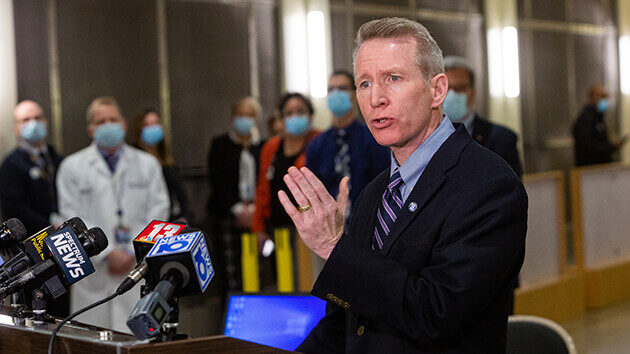Inside the System with Dr. Dennis McKenna

Dennis P. McKenna, MD ’92 is the President and CEO of the Albany Med Health System. An emergency department physician by trade, he previously served as medical director of the Albany Medical Center Emergency Department as well as president of the Albany Med Physicians.
Dr. McKenna details how the System is addressing unprecedented challenges and the latest successes in the areas of patient care, research, and education.
How would you describe the health of the Albany Med Health System?
A key part of assessing our health is looking at where we were compared to where we are today. Many factors — the Covid-19 pandemic, labor shortages, inflation, supply chain issues— have put a strain on the Albany Med Health System’s finances and our operations. We’ve weathered each of these storms thanks to a workforce that is second to none and which finds ways every day to lift up their colleagues and fulfill our purpose of providing the highest quality health care in an equitable and cost-effective way.
Ensuring long-term sustainability will require smart, sound, and innovative strategies. That’s why we’ve focused on eight key areas in our financial mitigation plan where we know we can make significant advancements. We’ve taken the step of implementing a six-month budget to begin 2023 instead of a full year’s budget. This allows us to be agile and respond to our most pressing needs in a timely fashion.
As a result, we’re seeing the early signs of improvements in terms of our financial health. Staffing levels are increasing. We’re meeting the growing need for our services while continuing to provide the world-class care our patients expect and deserve. There is more work to be done, but it is clear that we are showing positive signs of improvement.
What is being done to specifically address staffing shortages?
There’s no question that when the “great resignation” occurred, it left hospitals across the country with significant shortages in the number of skilled workers to provide needed care. Our response to this national problem right here at home has been to focus on the areas of retention and recruitment.
We’re taking a number of steps to invest in our workforce. Along with additional investments in benefits and salaries, we’ve focused on items like referral bonus programs as well as extras and advantages that support our recruitment efforts and our ability to retain employees. Our retention efforts are carried out with the mindset that having a workforce that feels valued, supported, and connected to our mission is a key to our success.
When it comes to our recruitment efforts, we’ve never been more active in the work we’re doing in the community. At Albany Medical Center alone, our human resources team attended more than 50 recruitment events in 2022. These efforts are being duplicated across our System hospitals. We’re creating pipelines for more talent through partnerships with regional colleges and universities.
Have the challenges you’ve mentioned had an impact on the integration of services and efforts across the Albany Med Health System?
While we focus on strategies that ensure our long-term sustainability, we’re also seeing the evolution and growth of our System. We now have more than 20 clinical and non-clinical areas that are operating as a fully integrated, or System, department.
In addition, another 15 areas, ranging from emergency medicine to patient safety, are cooperating and sharing vital information that supports their day-to-day work.
Our colleagues at the Visiting Nurses joined the Albany Med Health System in March 2022. As we discharge patients, the Visiting Nurses provide us with resources that allow patients to continue their recovery and receive care at home. Our hospitals and institutions have served our community for more than a century. Together, the services they provide have never been stronger.
Our Care One project is helping to put unified processes and systems in place that allow for better care, better uses of our resources, and which ensure that our campuses can securely and more easily share information with one another. The implementation of these systems over the next two years will be a game-changer across all we do.
Even with all the challenges — are there things that stand out that you’re the most proud of?
I go back to our mission — improving health by attaining the highest standard of quality in care delivery, education, and research. Countless numbers of our neighbors, friends, and family members are healthier because of what we do. In the past year alone, we’ve helped families by administering the first doses of the Covid-19 vaccine for children ages six months to five years, and our hospitals have responded quickly to a large number of RSV cases impacting children across our communities.
Our hospitals continue to receive national recognition in a number of areas — stroke, Alzheimer’s, breast care, and cancer care, to name just a few.
In terms of research, Albany Medical College led the Capital Region in funding received from the National Institutes of Health (NIH) in 2022. More than $11.5 million in NIH funding supported our researchers as they advance the conversation and make world- class breakthroughs in projects focusing on cancer, neurodegenerative diseases, and much more.
And, we’re educating the next wave of physicians and medical professionals that will provide world-class care for our region. Albany Medical College, under the leadership of Alan Boulos, MD, ’94, has continued to lead the way in terms of medical education, advancing new curriculums, and cementing itself as a destination for those looking to enter the medical field.